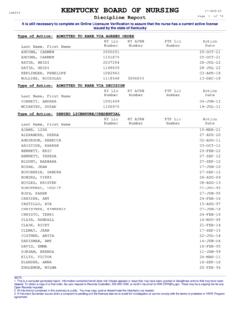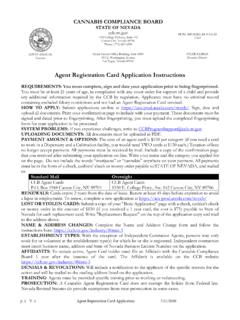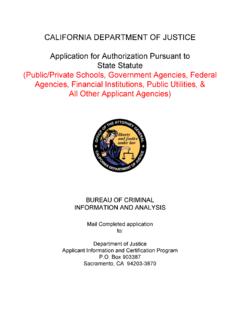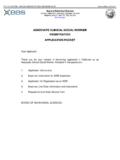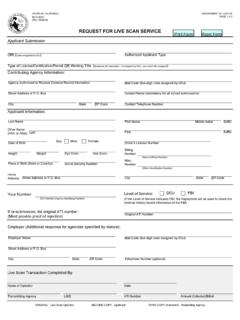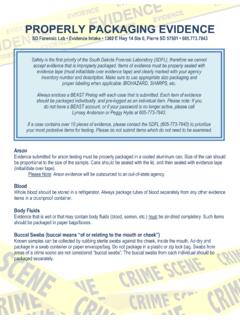Transcription of Kentucky Board of Nursing
1 Kentucky Board of Nursing Jurisprudence Examination Study Guide v2015-11 | NCSBN Learning Extension | | Copyright 2015 National Council of State Boards of Nursing , Inc. (NCSBN) 1 Kentucky Board of Nursing Jurisprudence Examination Study Guide November 2015 Introduction The Kentucky Board of Nursing (KBN) Jurisprudence Course provides nurses and all other stakeholders a concise explanation of the Kentucky Nursing Laws (KRS 314), Administrative Regulations (201 KAR 20) and Advisory Opinions. These documents can be accessed in their entirety on the Kentucky Board of Nursing website; links to these documents are also embedded throughout the course. This course is written to accompany the Kentucky Jurisprudence Examination, which must be completed by all licensure applicants. It is the intent of KBN that this content serves as a guide for nurses and provides a foundation for safe practice in the delivery of quality care for all citizens of the Commonwealth. Kentucky Board of Nursing The Kentucky Board of Nursing (KBN) is an agency of the Commonwealth of Kentucky , governed by the Kentucky Nursing Laws, which are found in the Kentucky Revised Statutes (KRS) Chapter 314.
2 Some refer to the Kentucky Nursing Laws as the Nurse Practice Act. The purpose of Nursing regulation in Kentucky is public protection. The Governor appoints 16 members to the Board of the KBN. Of these, 9 are registered nurses (RN), 1 is a Nursing service administrator, 3 are licensed practical nurses (LPN), 2 are non-nurse consumers, and 1 is an advanced practice registered nurse (APRN), per KRS (1) (a-e). Though the KBN is an arm of the state government, the Board is fiscally self-sustaining through the collection of fees for licensure services and mandatory fines collected from disciplinary action. The Board receives no money from state tax revenues. Why Regulations Matter Nursing is regulated because, as a health profession, it poses risk of harm if practiced by the unqualified and incompetent. Nursing regulation protects the health, safety and welfare of a Kentucky Board of Nursing Jurisprudence Examination Study Guide v2015-11 | NCSBN Learning Extension | | Copyright 2015 National Council of State Boards of Nursing , Inc.
3 (NCSBN) 2 public vulnerable to unsafe practitioners. Regulation also provides a mechanism for documentation of educational preparation and ongoing clinical competency. Nurses provide access to information about healthcare and assist consumers in dealing with injury and illness. Regulation of Nursing practice helps to assure that consumers get reliable information and safe care, services that they are seeking from their care providers. Regulatory boards also provide a process for approval of Nursing education programs. Kentucky law sets Nursing faculty education requirements, faculty to student clinical ratios, and guidelines for program of Nursing curricula. Why Regulations Matter (2) The duties of the Kentucky Board of Nursing (KBN) include the following tasks: Enforcing the Kentucky Nursing Laws and nurse licensure requirements Approving nurse education programs in school and universities Developing laws and administrative regulations Taking disciplinary action when the nurse provide unsafe Nursing care or otherwise violates KRS Chapter 314 Scopes of practice vary from state-to-state; therefore, nurses are responsible for knowing the regulatory requirements for Nursing and the nurse practice act in every state in which they practice.
4 According to Kentucky law, all individuals licensed or privileged to practice in Kentucky shall be responsible and accountable for making decisions that are based upon their educational preparation and experience and shall practice with reasonable skill and safety (KRS (2)). The Kentucky Nursing Laws The Kentucky Nursing Laws are enforced by KBN. Nurses must comply with these laws and related regulations in order to obtain and maintain their licenses. The laws, among other things, describe the following: Qualifications for licensure Nursing titles that are allowed to be used Scope of practice (what the nurse is allowed to do) Actions that can or will happen if the nurse does not follow the Nursing law Professional Associations The Kentucky Board of Nursing (KBN) recognizes that some confusion exists in what nurses perceive to be the scope and function of the Board of Nursing as compared to that of Nursing professional associations. Nursing professional associations are private organizations that advance the Nursing profession by addressing the practice, political and professional issues affecting nurses.
5 They carry out this mission by establishing standards of Nursing practice, promoting the economic and general Kentucky Board of Nursing Jurisprudence Examination Study Guide v2015-11 | NCSBN Learning Extension | | Copyright 2015 National Council of State Boards of Nursing , Inc. (NCSBN) 3 welfare of nurses in the workplace, projecting a positive and realistic view of Nursing , and lobbying the legislature and regulatory agencies on behalf of health care issues impacting nurses and the public. Membership in these organizations is voluntary for nurses. The list of Nursing professional organizations or associations is an extensive one. Kentucky Board of Nursing Jurisprudence Examination Study Guide v2015-11 | NCSBN Learning Extension | | Copyright 2015 National Council of State Boards of Nursing , Inc. (NCSBN) 4 Lesson 1 - Licensure Licensure & Credentialing A Nursing license is mandatory in Kentucky if an individual wishes to use the title advanced practice registered nurse (APRN), registered nurse (RN) or licensed practical nurse (LPN).
6 If one holds herself/himself out to be an APRN, a RN or LPN, a license is required even though an individual is not employed as a nurse. KRS (1) (a)-(e) allows the following without a Kentucky Nursing license: The practice of Nursing which is incidental to the program of study by individuals enrolled in Nursing education programs and refresher courses approved by the Board or in graduate programs in Nursing The practice of any currently licensed nurse of another state practicing in this state during an emergency, occurring in this state or any other state, declared by the President of the United States or the Governor of Kentucky The practice of any legally qualified nurse of another state who is employed by the United States government The practice of any currently licensed nurse of another state whose responsibility includes: transporting patients into, out of, or through this state; providing Nursing consulting services; or presenting a continuing education program The practice of volunteer health practitioners under KRS 39A.
7 Nurse Licensure Compact Kentucky is a member of the Nurse Licensure Compact. This means that for nurses in good standing, KBN will issue a multi-state license that grants Kentucky nurses the privilege to practice in other compact states. In order for a nurse to have a compact license, he/she must declare his/her permanent residence in a state that is a member of the compact and have an unencumbered (no current disciplinary action or not participating in an alternative discipline program) active RN or LPN license. Once a nurse has an active compact license in his/her primary state of residence (home state), the nurse has the privilege to practice Nursing in other compact states (remote states). You can use this link to access a list of current NLC Member States. The nurse is required to follow the Nursing laws/regulations where he/she is practicing Nursing . The nurse is also required to follow the Nursing laws/regulations for licensure in the state of his/her primary residence.
8 Should the nurse violate Nursing laws and regulations, the remote state may take disciplinary action on the nurse s privilege to practice in their state; the home state may also take disciplinary action on the nurse s license. At this time, the compact does not apply to APRNs. If an APRN holds a compact (multi-state) RN license, he/she is still required to obtain a Kentucky APRN license to practice in the advanced registered Nursing practice role. Kentucky Board of Nursing Jurisprudence Examination Study Guide v2015-11 | NCSBN Learning Extension | | Copyright 2015 National Council of State Boards of Nursing , Inc. (NCSBN) 5 Nurse Licensure Compact (2) Nurses changing their primary residence from one compact state to another have thirty (30) days to endorse into the new compact state. A nurse may only be licensed in one compact state and that is the state of residency. A temporary work permit issued by a compact state prior to licensure by endorsement is valid in other compact states.
9 Provisional licenses or other temporary permits issued prior to passing NCLEX are not valid in other compact states. A nurse who claims his/her primary residence in a state that does not belong to the compact (non- compact state) must obtain a license in every state in which he/she practices Nursing . If a nurse changes his/her primary residence to a non-compact state, the Kentucky license will become a non- compact, single state license and he/she can no longer practice in other compact states on the single-state license. Current Mailing Address The Kentucky Nursing Law requires all nurses to maintain a current mailing address with the Board of Nursing . According to KRS , any person licensed by the Board shall maintain a current mailing address with the Board and shall immediately notify the Board in writing or change their address online at Criminal History Reporting All applicants for licensure in Kentucky are required to report any misdemeanor and/or felony conviction(s) EVER received by listing each occurrence on the application for licensure.
10 A certified copy of the disposition page of the court record of each misdemeanor and/or felony must be submitted to KBN, along with a letter of explanation. Driving under the influence (DUI) convictions are required to be reported. Traffic violations do not have to be reported. Other than a driving under the influence (DUI) conviction, traffic violations do not have to be reported. Failure to report any criminal conviction EVER received is deemed to be falsification of the application and subjects the applicant to potential disciplinary action by KBN. Kentucky Board of Nursing Jurisprudence Examination Study Guide v2015-11 | NCSBN Learning Extension | | Copyright 2015 National Council of State Boards of Nursing , Inc. (NCSBN) 6 Criminal History Reporting (2) Use the following table to determine if a criminal conviction must be reported and the required documentation. MUST REPORT SUBMIT ALL FELONIES Certified course documents and a detailed letter of explanation ALL misdemeanors, including DUIs, received within 5 years of the date of the application Certified court documents and a detailed letter of explanation ALL misdemeanors, including DUIs, received prior to 5 years of the date of the application Must report, but no documentation is required Criminal Background Checks Kentucky Law requires applicants for licensure by examination and reinstatement to submit a state and federal criminal background check.
